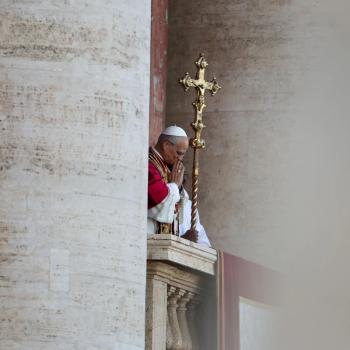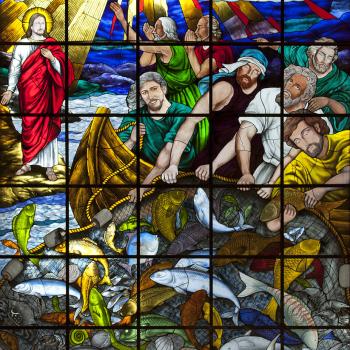By Elizabeth Scalia
 When I was a little girl, our family knew a Frenchwoman. I don't recall her name, but I remember her vividly. She seemed to me very glamorous and mysterious, forever wearing a too-bright shade of lipstick, smelling of a heavy overlay of carnation and a dim underlay of what I now recognize as vodka. She would always gravitate toward the children, where she joined in our games or (endlessly) corrected our accents as we sang "Frère Jacques."
When I was a little girl, our family knew a Frenchwoman. I don't recall her name, but I remember her vividly. She seemed to me very glamorous and mysterious, forever wearing a too-bright shade of lipstick, smelling of a heavy overlay of carnation and a dim underlay of what I now recognize as vodka. She would always gravitate toward the children, where she joined in our games or (endlessly) corrected our accents as we sang "Frère Jacques."
Part of what made her seem so glamorous was the suggestion about her that she knew something we did not -- that she had made an acquaintance with darkness and had never completely broken free of it. In retrospect, of course, there is nothing glamorous about that, but when you are five or six and you come to understand such a thing, you feel almost heady in your wisdom, included in something grown-up.
The reminder that this madame had something bubbling beneath her too-gay surface was always the same. At some point of an evening's cheer she would cover her ears to protect herself from hearing any bad news. "Ah, non. Do not say! It is too, too sad; I cannot bear it! These colors are too dark! Give me only the pastels!"
When I was five or six, that seemed like a grand plan by which to live one's life. It sounded wise, and sad, and true.
The Frenchwoman has been very much in the fore of my reveries lately. I hear her soft pleading when I turn on the television to see endless pictures of unspeakable loss in Southeast Asia and of the devastated tsunami victims. She echoes in every piece of "compassion-minded legislation" that purports to relieve suffering through the magic of government intervention. More and more frequently, I recall that tremulous "non, non -- give me only the pastels" as I try to categorize the images of a much more personal tsunami: my brother's impending death.
Through four months of shared caring, first at home and then in an excellent hospice, our family has been saying a long good-bye to a middle brother who is now lingering somewhere between heaven and earth. In that time we have shared moments of suffering with him, as well as moments of spontaneous and keen humor, which can approximate joy if one is looking for it. There have been evenings full of grace, both the natural and supernatural kinds, most particularly on a night when our brother's room seemed suffused with a gentle light and with a pleasing, indescribable scent that one experienced nurse identified for us. "We call that the scent of heaven," she smiled. Amid such circumstances, and with our brother still able to talk with us, to pray with us, and to share his thoughts and feelings, it was not difficult to feel some awe at the whole process of dying and to find an appropriate pastel-shade with which to regard it all.
That has changed, of course, as we knew it would. Over the past two weeks our pastels have been used up, and as I make the journal entries I feel compelled to write, it seems as if only the darker shades remain. After months of lingering on the periphery, our family has finally and fully stepped into the Via Dolorosa, the Way of Sorrows. "Non, non, it is too sad . . . I cannot bear it . . ."
No, I cannot yet bear to write it. It is too sad. Yet the images churn inside me, begging release, and there are so many of them. We have watched efficient nurses administer pain medicine to my brother and then, with eyes brimming, give him sound kisses on his forehead. "I don't know what we're going to do when he leaves us," one nurse choked to me, "we all love him so, and it's not going to seem right without him here."
Another nurse, her shift ended, was discovered sitting by his bed in the wee small hours. "I just wanted to keep him company and pray for all of you," she offered.
Our brother has lately gone quiet. He moans and coughs. When he does speak it is a word or two, soft and hoarse and largely unintelligible. Our visits are less conversational. The time of sharing memories and managing a smile or two is past. Now, it is all about stepping outside so that our brother can be turned and resettled, stepping back inside to help him eat, stepping back outside while he is turned again.
Many would contend that what life our brother has left is only pathetic, a life of suffering and sorrow, that counts for nothing. Many would say it. What I say in response is this: My brother's life today is exactly like his life ten years ago. It is huge, it is love-filled, and it is fraught with humanity. It is the life he has.





